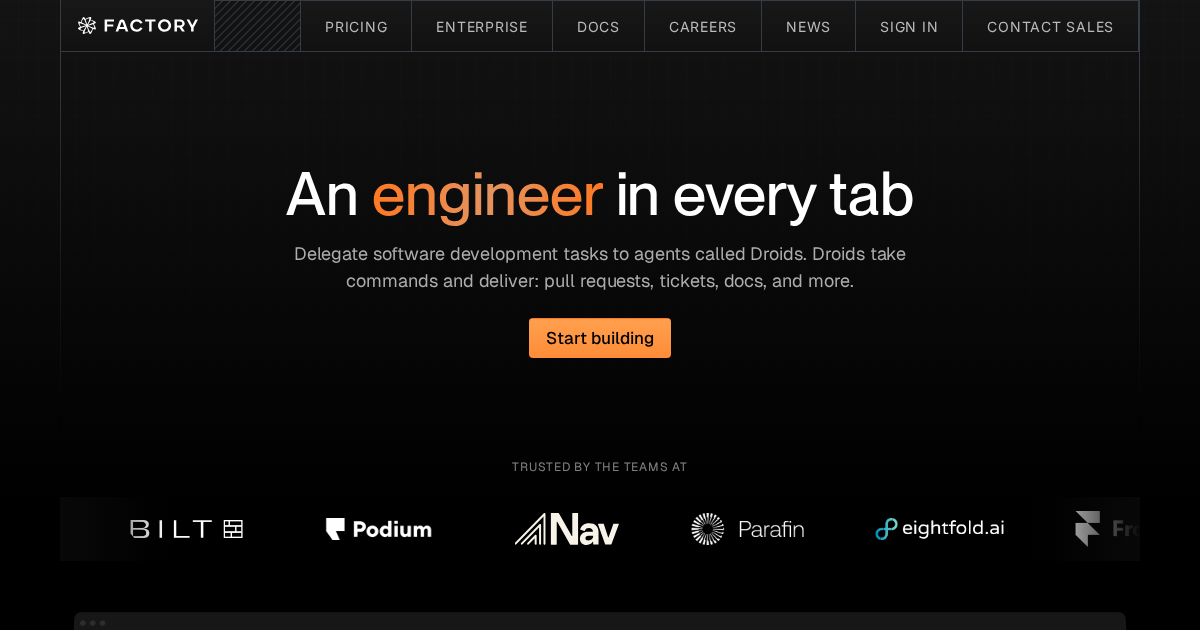Factory.ai
AI-driven connected-worker platform that converts tribal knowledge into digital work instructions, reduces errors, speeds onboarding, and delivers production insights.

Tool Information
About Factory.ai
Overview
Factory.ai is an AI-powered connected-worker platform designed for manufacturing and industrial operations. It captures and codifies frontline knowledge into reusable, digital work instructions and interactive procedures, enabling consistent execution, faster onboarding, and measurable process improvements.
Key Capabilities
- AI-driven knowledge capture: Turn expert know-how—video, photos, text—into structured digital procedures and searchable guidance.
- No-code editor: Build, edit, and publish step-by-step work instructions quickly without engineering resources.
- Interactive operator guidance: Deliver context-aware instructions on mobile devices or tablets at the point of work.
- Offline support: Allow workers to access content in low- or no-connectivity environments (where supported).
- Analytics & performance insights: Track compliance, time on task, error rates, and continuous improvement opportunities.
- Integrations: Connect with ERP, MES, PLM, and other factory systems to sync work orders, asset IDs, and contextual data.
- Version control & audit trails: Manage document versions, approvals, and change histories for compliance.
How It Helps
Factory.ai focuses on reducing variability and knowledge loss across manufacturing operations. Typical outcomes include:
- Reduced training time and ramp-up for new hires
- Lowered error and rework rates through standardized processes
- Faster capture of tribal knowledge before experts leave
- Improved traceability and audit readiness
Who Should Use It
Factory.ai is aimed at manufacturers and industrial operators who need to operationalize frontline knowledge — including production managers, quality engineers, training teams, and continuous improvement leaders.
Pros
- Speeds conversion of tacit knowledge into usable digital procedures
- No-code authoring lowers dependence on IT teams
- Built-in analytics for measurable ROI tracking
- Designed for frontline usability on mobile devices
Cons
- Enterprise-grade integrations or customizations may require services or professional support
- Some advanced AI capabilities depend on quality of source media and initial content capture
- Pricing and licensing can be opaque without direct vendor engagement (typical for specialized industrial SaaS)
Typical Use Cases / Tasks
- Create step-by-step work instructions from subject-matter-expert recordings
- Digitize SOPs and make them accessible at the point of work
- Deliver microlearning and on-the-job training to new operators
- Integrate with MES/ERP to surface the right instructions per work order
- Collect execution data to identify bottlenecks and improvement opportunities
Security & Compliance
Factory.ai typically supports enterprise security controls such as role-based access, user authentication, and audit logs. For regulated industries, platform features like version control and approvals help meet compliance and traceability requirements. Prospective customers should validate data residency, encryption standards, and integration security during evaluation.
Getting Started
Implementation commonly follows a pilot-first approach: select a single line or process, capture and publish core procedures, measure impact, then scale across sites. Vendor support and professional services are often available to accelerate rollout.
Conclusion
Factory.ai is positioned as a practical solution for manufacturers wanting to capture frontline knowledge and improve operational consistency through AI-assisted digital work instructions. It is especially valuable where workforce turnover, training needs, and process variability drive operational risk.
Key Features
F.A.Q
Pros and Cons
✓
Pros
- + Rapid conversion of frontline knowledge into digital procedures
- + No-code authoring and easy updates
- + Packed with analytics for measurable improvements
- + Designed for mobile/point-of-work usage
−
Cons
- − Enterprise integrations may require professional services
- − Effectiveness depends on quality of captured source content
- − Pricing/licensing often requires direct vendor discussion
Reviews
No reviews yet. Be the first to review this tool!
Applicable Tasks
Promote
Share this Tool
Similar AI Tools
Discover other tools similar to Factory.ai.
Zed
Zed is a lightning-fast, local-first code editor with built-in real-time collaboration, code intelligence, and cloud sync for modern developer teams.
Jules — AI Storytelling & Creative Assistant by Google
Jules is an experimental Google AI that helps creators brainstorm, draft, and refine stories and creative text with a simple conversational interface.
ChatKit Studio
No-code platform to build, customize, and deploy AI chat widgets and assistants with integrations, analytics, and easy website embedding.
OpenAI Codex
An AI system that translates natural language into code, generates and explains code snippets across many languages and integrates via an API for coding assistants.
